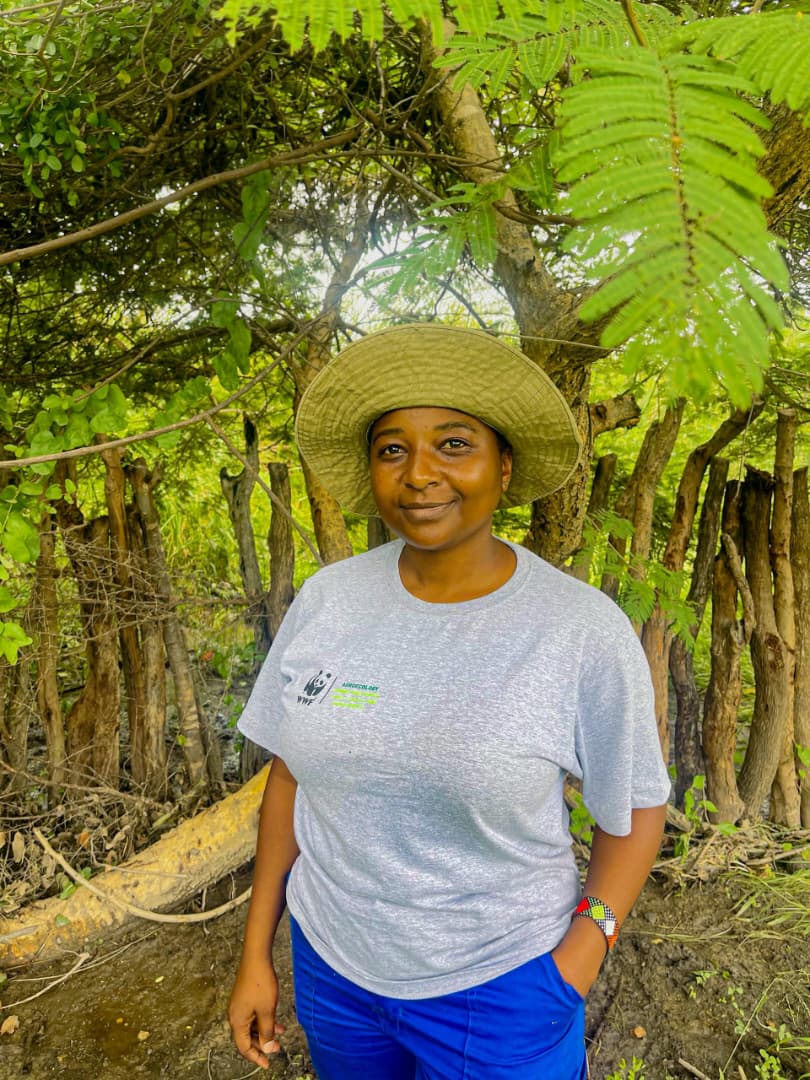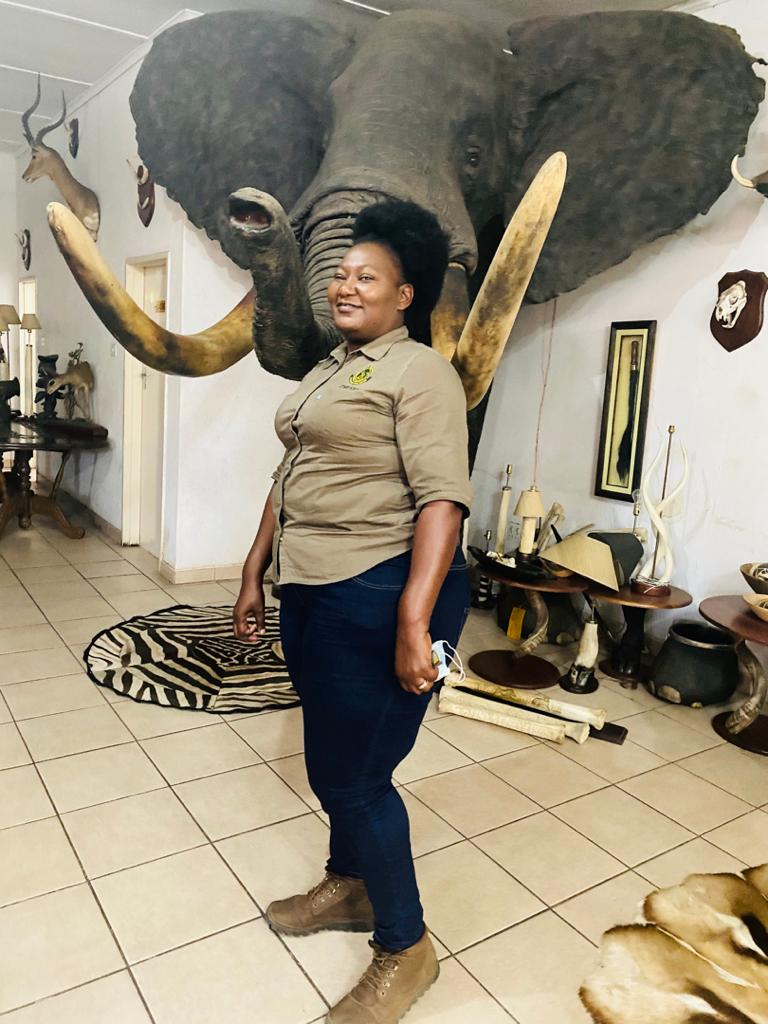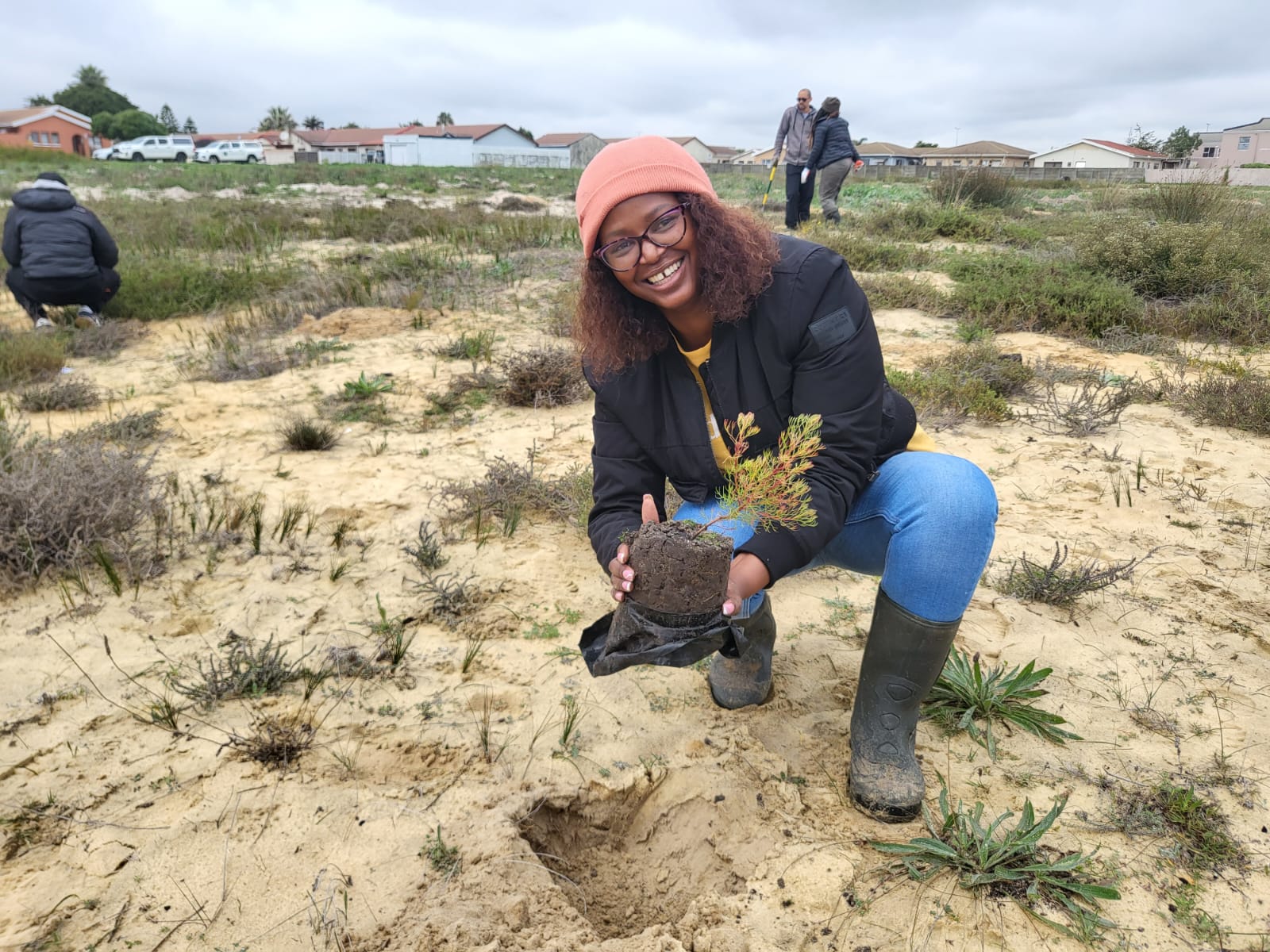This interview is part of a series profiling the stories of the 2024 WE Africa leadership programme fellows, African women in the environmental conservation sector who are showing up with a strong back, soft front, and wild heart.
***

As a child, Trish Sewe was a walking-talking hurricane of mischief. If there was an adventure to be had, she was leading it. If there was trouble brewing, odds were, she was the mastermind.
“I may have been tiny, but I ran things,” she says.
Nothing quite captures the unfiltered chaos of her childhood like the time she decided to turn her parents’ house into a giant swimming pool. The logic was solid. Water + floor = pool. So, Trish did what any self-respecting mischief-maker would do—she rallied every kid in the neighbourhood, turned on all the taps, and let the water do its thing. Simple. Effective. Genius.
“We had this long corridor in our house that we converted into a slide. And because clothes slowed us down, we removed them. I mean if you’re gonna slide, you slide properly,” she says with a grin.
It was glorious—until a very unimpressed neighbour, a doctor, whose own kids were in on the chaos, showed up. He took one look at the madness and damn near had a heart attack. He ordered the kids to get dressed and kicked them out of the house. Word had already spread when Trish’s mum got home from work.
“I don’t even remember the punishment," Trish says. "I remember the fun. Because honestly, it was so worth it!”
Looking back, it's clear that even in those wild, rebellious moments, Trish wasn’t just a troublemaker—she was a leader in the making.
***
Eventually, the ringleader of mischief grew up; she had no choice. “I was the firstborn; people expected me to be the example. They’d say things like, why can’t you be like Trish? And after a while, I just owned it,” she says.
She stayed out of serious trouble and played the part of the responsible older sibling. But Trish didn’t just grow up—she grew up fast. By the time most kids started school at six, Trish was already two years in. But she refused to be overlooked. Her weapon of choice was her voice.
“I was little, but I wanted people to know I was just as smart and capable. So I made sure they heard me,” she says. It didn’t matter if it was Science, Math, History, or some completely random fact—Trish had an answer. And if she didn’t, she’d make one up.
Her reputation had already been cemented by the time she hit high school. But her mom still felt the need to issue one last warning on the drive there: “Just watch your mouth, Trish. Please. I don’t want to hear you got sent home because of that mouth.”
When they got to school, the principal, who, incidentally, was also her mum’s former high school teacher, took one look at her—a tiny 12-year-old standing there in an oversized uniform. She immediately pointed them toward the primary school section.
Trish’s mum sighed. No, she’s here for Form 1.
The principal blinked. Then, with the utmost seriousness, she asked: “Can she even hold a broom?”
Trish, of course, was offended. She could hold a broom. Probably run the school too, if they let her. However, since she looked like a strong gust of wind could carry her away, the principal took pity on her and assigned her the head girl as her official ‘school mom’. A buffer against any potential bullying.
“The funny thing is everyone came to me for advice. Maybe it was because I always had something to say—even when I had no clue what I was talking about. But people just assumed I knew things,” she says.
By 16, she was already in college. Not even old enough to legally exist in some systems but totally owning her space—just like always.
***
When it was time to pick a career, the choice was obvious: communication. In college, she specialised in TV production and dabbled in editing, video, radio and print media. She also got a few articles published in newspapers. But media wasn’t where she’d ultimately land. Instead, an unexpected opportunity came knocking—an international NGO was looking for someone to run their PR. “Give me a year,” she told them. “I’ll build your department from scratch.” And she did.
Eventually, she stepped into a leadership role as their communications manager and spokesperson and helped establish their US office. Trish was thriving. But there was one thing no one knew: for all her confidence, she was very shy.
“I’m a Libra, so I feel everything—all at once. I can be sad and happy in the same moment, and for the longest time, I couldn’t figure out how that even made sense,” she says.
And so, on the outside, Trish had always radiated confidence. But on the inside, she was a bag of nerves. Overthinking everything and feeling fear that twisted her stomach into knots. She’d admit she was shy, but no one believed her because she was a master at covering it up. One day, her boss did the unthinkable.
Trish, you need to get on a plane. You’re speaking at Stanford University, she said.
“And I was like, What?!” Trish says. “This was a huge conference with the who's who. And I was just this tiny girl from Kenya. I was freaking out.”
Still. she got up there, took a deep breath and spoke.
She got a standing ovation.
Trish was stunned. What had felt like a setup from her boss turned out to be one of the best things that ever happened to her. Because that was when it hit her that maybe her voice truly mattered.
***
From then on, Trish kept levelling up. She pursued her degree in Communications and Sociology, followed by a Master’s in International Studies before moving to the US. She worked across multiple nonprofits and met her current boss while she was part of the organising team for a leadership workshop for some of Africa’s top-level executives that took place at the Multimedia University of Kenya. It started with a casual conversation that led to an interview that landed her a job as the Communications Manager at WildlifeDirect. The rest is history.
Today, Trish runs the organisation's operations and doubles up as the Chief of Party for the National Geographic’s Team, Sayari and Nature Positive Kids Outreach Program at the same organisation.
I ask her whether she still feels the need to “fake” her confidence.
“I still get scared, but I have the right people in my corner. If something terrifies me, I know I can reach out and say, ‘I’m freaking out about this’, and they will help me get through it. I’ve learned that if something scares me, that’s usually a sign that it’s what I need to do. That’s why I take on challenges even when I have no idea how to pull them off—because somehow, through God’s grace, I always find a way.”
“I’m also grateful to have met amazing women—my mother included—who have inspired me and been the shoulders I could lean on.”
One of those women was Dr Musimbi Kanyoro. Trish met her when she was in California.
“The few times I visited her home, she’d cook Kenyan food, and that simple act made me feel safe. She probably has no idea how much she shaped my leadership, but I learned so much just by observing her—how she carried herself, shared her story, and treated her team when she was the CEO and President of the Global Fund for Women.
“Watching her made me want to be like her, a leader who listens and supports the people I work with. And what I appreciated most was how organic it was.”

And so, Trish shows up for young people through speaking engagements and vision-boarding sessions where she shares the information to empower them to make informed choices in life. Her message to them: Own your life. Make your own choices, and follow through. No excuses. No pointing fingers at your parents, friends or circumstances. It’s your life, your responsibility.
***
Trish has worked hard to get to where she is. And now, having gone through the WE Africa programme, she’s starting to see things slightly differently: For instance, being known as unstoppable isn't always a compliment.
“In 2008, I was on the cover of the Saturday Magazine,” she recalls. “I looked so put together. But I was seriously ill when we took that picture. And that’s just who I was—I’d push through anything. I’d never stopped to ask if this was sustainable.”
And why would she? This was the culture she had known all her life.
“I started working young. I never had a break. And I struggled to say no. So I just kept going," she says.
At work, people call her the glue that keeps everything together. Because she gets things done.
“My coach asked me, You say respect and honesty are your biggest values. But do you respect your own time? Are you honest with yourself?”
That one hit.
Trish had built a life around showing up for others and handling crisis after crisis without missing a beat. “But I wasn’t respecting my own time. I wasn’t honest with myself about how much I was pushing. I had to face the truth. I was burning out.”
So she started making changes. Small at first. But radical in their own way. “Even on my vacation, I used to work. I'd call it a workcation,” she says. “Nowadays, when I'm off, I do things that are just for me,” she says.
There’s something Trish wants young people to know:
“Go for it. Especially if it scares you. You won't have all the answers, but that's OK. You’ll figure it out as you go. And, importantly, do what you love. Your passion will carry you on the days you lack strength. The only issue is when you love what you do, you don’t realise you’re overdoing it. So don’t forget balance. Because no matter how much you love what you do, you also need to take care of yourself because no one else will.”





